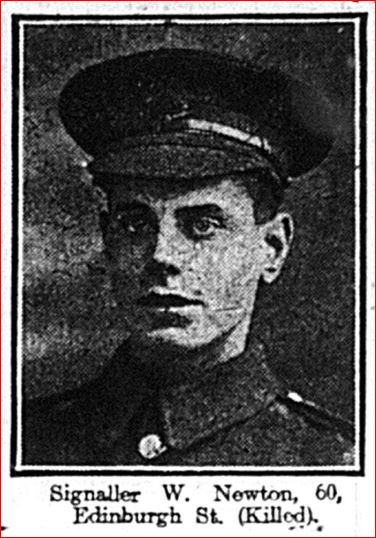Pte
Francis William Newton
Informations sur naissance
|
Date de naissance: 11/11/1897 |
|
Lieu de naissance: Bradford, Yorkshire, Angleterre, Royaume-Uni |
Informations générales
|
Profession: Ouvrier de la filature de laine |
Informations service militaire
|
Pays: Angleterre, Royaume-Uni |
|
Force armée: British Expeditionary Force |
|
Rang: Private |
|
Numéro de service: 38114 |
|
Unités: — Alexandra Princess of Wales's Own (Yorkshire Regiment), 2nd Bn. (Dernière unité connue) |
Informations sur décès
|
Date de décès: 01/09/1917 |
|
Lieu de décès: No. 1 Australian Casualty Clearing Station, Bailleul, France |
|
Cause du décès: Died of wounds (D.O.W.) |
|
Âge: 19 |
Cimetière
|
Outtersteene Communal Cemetery Extension Parcelle: I Rangée: B Tombe: 49 |
Distinctions et médailles 2
|
British War Medal Médaille |
|
Victory Medal Médaille |
Points d'intérêt 2
| #1 | Lieu de naissance | ||
| #2 | Lieu du décès (approximatif) |
Mon histoire
Private (Signaller) Francis William Newton was part of the 2nd Bn. Alexandra Princess of Wales’s Own (Yorkshire Regiment), also known as the Green Howards. The battalion was part of the 21st Brigade, 30th Division. Francis William worked at a wooden mill, John Smith and Sons, Limited, Fieldhead Mills.
During the Battle of Passchendaele the 30th Division took over the Messines-Wytschaete front from August on. The frontline was at the bottom of the eastern slope of the hill below Oostaverne. On August 30th the battalion relieved the 18th Bn. King’s Liverpool Regiment in the frontline and took over the shell hole positions. The war diary mentions that the situation was quiet on 1 September and that there were the usual working parties and patrols. Private Newton must have been wounded during one of these tasks. In a newspaper article is mentioned that a letter was sent by one of his comrades saying he was struck by shrapnel and died of his wounds at an Australian Casualty Clearing Station. The N°1 Australian C.S.S. was located in Bailleul at that time. He succumbed of his wounds and was buried at Outtersteene Communal Cemetery Extension in Bailleul (FR.), where he is still remembered today.
During the Battle of Passchendaele the 30th Division took over the Messines-Wytschaete front from August on. The frontline was at the bottom of the eastern slope of the hill below Oostaverne. On August 30th the battalion relieved the 18th Bn. King’s Liverpool Regiment in the frontline and took over the shell hole positions. The war diary mentions that the situation was quiet on 1 September and that there were the usual working parties and patrols. Private Newton must have been wounded during one of these tasks. In a newspaper article is mentioned that a letter was sent by one of his comrades saying he was struck by shrapnel and died of his wounds at an Australian Casualty Clearing Station. The N°1 Australian C.S.S. was located in Bailleul at that time. He succumbed of his wounds and was buried at Outtersteene Communal Cemetery Extension in Bailleul (FR.), where he is still remembered today.
Sources 6
|
Ancestry https://www.ancestry.com/ Sources utilisées |
|
CWGC https://www.cwgc.org/find-records/find-war-dead/casualty-details/42448/FRANCIS%20WILLIAM%20NEWTON/ Sources utilisées |
|
Long Long Trail https://www.longlongtrail.co.uk/ Sources utilisées |
|
War Diary http://www.nmarchive.com/ Sources utilisées |
|
War Diary https://www.awm.gov.au/collection/C1338718 Sources utilisées |
|
Wylly H. C., The Green Howards in the Great War, 1926, Richmond Yorkshire, pp. 95-96 Sources utilisées |
